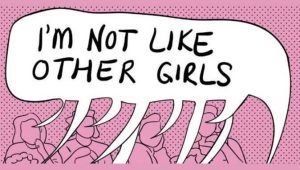CATEGORIES
#Breaking Stereotypes #Gen Z #Women EmpowermentOverview
- Pick-me girls are defined as someone who goes out of their way to appeal to men.
- The patriarchal rule of society has framed women as inferior to men for centuries.
- Women are conditioned and socialized to believe they and that their entire gender is inferior, and many girls unquestionably just accept that.
- This whole trend stems from the belief that a woman’s ultimate goal is to get a man, and anything and everything she does or does not do, is to fulfill that goal.
- Whether a woman chooses to not use makeup or rocks an excellently made-up face, she does so for herself, because she enjoys it.
- Society has, to an extent, successfully taught women to regard their sex as inferior, as the second sex.
The “Pick-Me” Girls
A viral social media trend depicting women as toxic and pitting them against one another has emerged in the realms of the famous social media platform, TikTok. Look up “pick me girl” and you will see a bunch of comical spoofs and jokes making fun of this female character. But, who is a pick-me girl?
In internet language, she is “not like the other girls”, she “does not engage in girl drama”, and she is “one of the guys” i.e., the “perfect, low-maintenance girlfriend.”
Urban Dictionary has defined pick-me girls as someone who goes out of their way to appeal to men. They are the type of girls who are not into the traditional feminine ideals and claim to like sports, brag about how low-maintenance they are, don’t wear make-up, and shame other women who do so. Much is wrong with this portrayal of women—and we shall explore this mindset.

The Origins of the Trend
Though like all trends in the fast internet world, the beginning of this trend is also ambiguous, we can trace it back to a similar one on Twitter. In 2016 and 2018, the hashtag #TweetLikeAPickMe went viral to mock women who boast about being “wifey material” by bringing down characteristics of other women that could explain why they’re single. Later on, in 2021, TikTok comedic skits surfaced to make fun of the “pick-me” girl.

To understand where the concept of pick-me girls roots from, it is necessary to explain what internalized misogyny is beforehand. The patriarchal rule of society has framed women as inferior to men for centuries. Even as children, this is what we are taught to believe: that women are weak, incapable, and submissive. We are indoctrinated with these sets of beliefs throughout our lives. Boys will treat girls accordingly while girls will see and treat themselves in the same way.
The Internalized Misogyny and Effects on Young Girls
This internalized misogyny is an all-too-prevalent phenomenon in our society. Women are conditioned and socialized to believe they and that their entire gender is inferior, and many girls unquestionably just accept that. They grow up to reiterate sexist ideas that are manufactured by patriarchy and enforce them onto other women or even themselves in a subconscious manner. The victims of patriarchy then become the gatekeepers of it and the vicious cycle carries on. The concept of internalized misogyny leads women to bring each other down, contradicting the long-term mutual fight against oppression which does not benefit anyone but men.
The pick-me girl trend is rooted in this same phenomenon and is caused by the gendered socialization we all are subject to. Repeatedly, girls hear comments and conversations that boil down to the idea that a girl’s worth is defined by a man picking them and that men are more likely to pick girls who are either perfectly feminine or not feminine at all. This pressure and repetitive reinforcement lead to girls internalizing this. They grow up viewing other women who might get “picked” instead of them as their competition. This mentality transcends to the workplace and other areas where women work together. They put down their gender and devalue the traits which make them unique.

The trend stems from women—who have traditionally been overlooked—wanting to stand out and be seen. In the process, we forget that we might be demeaning our tribe. The impact on young girls is significant, and it can lead to lower self-esteem and an innate need to be someone they are not in order to conform to the male gaze.
The Phenomena of Being “Attractive”
On the flip side, women and girls who naturally do not like or engage in stereotypically “feminine” roles and activities are given a label, when in fact they are just being their authentic selves and not looking to be “picked”. This whole trend stems from the belief that a woman’s ultimate goal is to get a man, and anything and everything she does or does not do, is to fulfill that goal.
However, (news flash) whether a woman chooses to not use makeup or rocks an excellently made-up face, she does so for herself, because she enjoys it. Neither is because she thinks it will help her attract more men because frankly, she is not looking for them. Women are often advised to do certain things and refrain from others because they are not attractive—but we are not trying to be.

We need to stop assuming or expecting women to mould their behavior to either make others comfortable or to look like the perfect partner for men.
The Nurturing Sisterhood
Society has, to an extent, successfully taught women to regard their sex as inferior, as the second sex. And essentially this is where the “pick me” or “not as other girls” trend originates. To set themselves apart, girls might go against their intrinsic likes. Or even if they do not like typically feminine attributes naturally, they may put down other women for liking what is natural for them. However, this generation of women is recognizing the internalization they have been subject to, and are rising against it through sisterhood. When society pits us against one other, the strongest mode to rebel is to resist and stand together. Showing affinity to other women and being their support is right and always pay off.

Conclusion
At Girl Power Talk, we nurture a culture of love and sisterhood. All our Young Leaders support and celebrate each other. They have mutual wins and their shared happiness is greater than any individual celebration. This promotes a warm feeling of mutual respect and learning, which helps each individual grow to their full potential and become harbingers of change.


